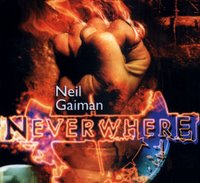As Above, So Bellow

According to the author, “Neverwhere” started as a TV miniseries for BBC, it become a novel where “with every scene that was cut, every line that vanished, everything that was simply changed” would be placed back in the novel as a way for the author to regain his “equilibrium”. The novel by itself was first published in the UK, adapted “for Americans who might not know where Oxford Street was or what you’d find if you walked down it” while at the same time revisited and expanded. The UK and US version were then merged, creating the version I got to read: the so called “Author’s preferred text”.
My only previous contact with Neil Gaiman’s work was “Good Omens”, which he wrote in conjunction with Terry Pratchett and was therefore diluted, other than that I only knew him by fame. Having nothing to read, I wandered around the Fantasy/Sci-fi section of the bookstore and came across a few books by him. After hesitating for a while I decided to give it a try and picked up one that seemed the most interesting. The book’s name, as you have already guessed, was “Neverwhere”.
The basic plot of “Neverwhere” is about a man called Richard Mayhew, who one day helps a wounded girl named Door who stumbles into the ground in front of him. Suddenly he realizes that all his life, as well as himself, seem to no longer exist in the “real world” and with little option left, he goes to seek the girl he helped in the hope of getting his life back. And thus he descends into London Bellow, a place filled with strange people and places.
As I expected, the book was dark and weird, taking some time for me to get used to it. One curious detail of the book is that things are not always explained, they tell you what and where, but not why. Eventually you find yourself, much like Richard, simply accepting what you’re told, and personally I find this to be one of the best points of the book.
Its heritage from the TV series is also, sometimes, quite visible as there are several characters who are introduced, show up for a couple chapters or so and then simply vanish. Most noticeably a guy named Varney and the girl Anasthesia (this last one, however, will not be forgotten, not by the main character and not by you).
Character-wise, it presents you lots of interesting and bizarre characters, from the Marquis de Carabas to Old Bailey, passing by the Rats and the Black Friars, into the bad guys on service: Mr. Croup and Mr. Vandemar, that though not too deep are the kind of villains one will love/hate (love to hate?). They are the kind of bad guys that will, quite literally, eat puppies for breakfast.
There are many references to London, both in real and unreal locations and in character names and type, this causes that some knowledge of the city would probably be a good help in the understanding of book. Not being my case, I was sometimes left to wonder.
The book did not disappoint me, but it also didn’t surprise me. There was a twist at every turn and yet… one will feel that the ending, although adequate, will simply follow the road and more often than not become a bit cliché, on one occasion or two you’ll even see it coming, on many others it will simply not surprise you. I wonder if this is due to Gaiman’s or if it’s something related to it being a TV show.


